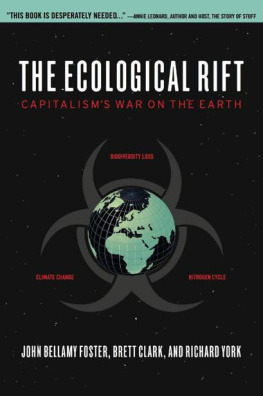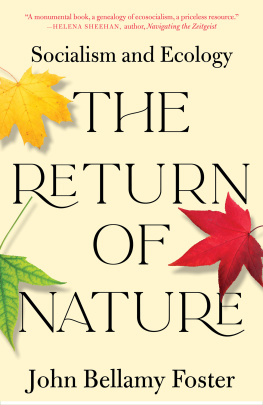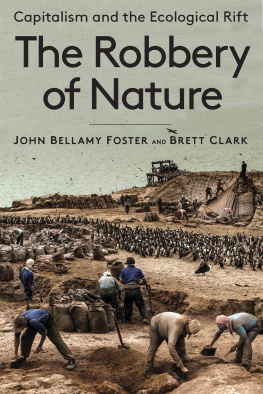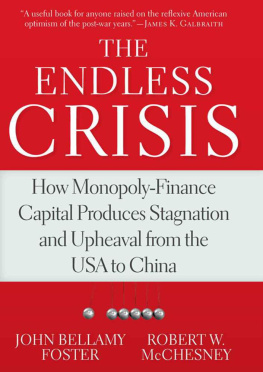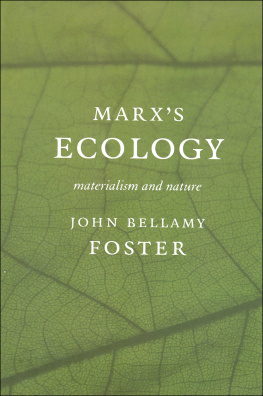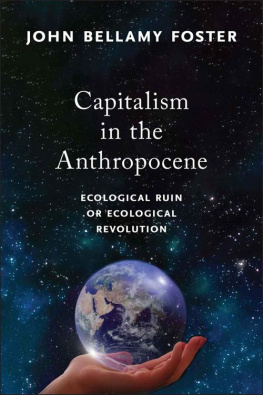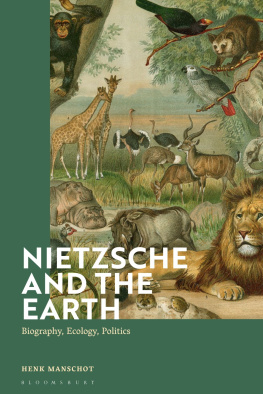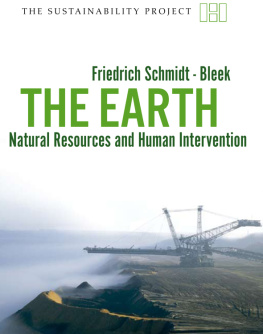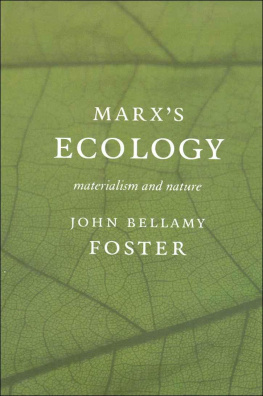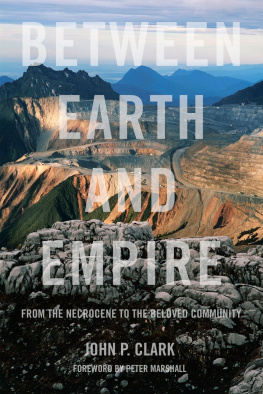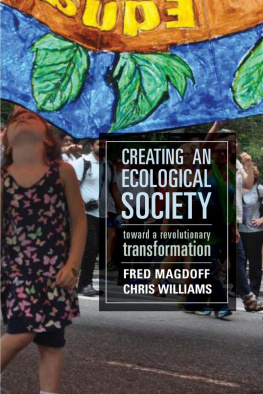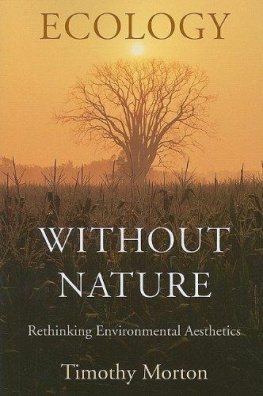THE ECOLOGICAL RIFT
THE ECOLOGICAL RIFT
Capitalisms War on the Earth
by John Bellamy Foster, Brett Clark,
and Richard York

Copyright 2010 by John Bellamy Foster, Brett Clark, and Richard York
All rights reserved
Library of Congress Cataloging-in-Publication Data
Foster, John Bellamy.
The ecological rift: capitalisms war on the earth / by John Bellamy Foster, Brett Clark, and Richard York.
p. cm.
ISBN 978-1-58367-218-1 (pbk.)ISBN 978-1-58367-219-8 (cloth)
1. Capitalism. 2. Environmental degradation. 3. Climate change. I. Clark, Brett. II. York, Richard, 1971- III. Title.
HB501.F658 2010
333.7dc22
2010035831
Monthly Review Press
146 West 29th Street, Suite 6W
New York, NY 10001
www.monthlyreview.org
5 4 3 2 1
Contents
PART ONE
Capitalism and Unsustainable Development
PART TWO
Ecological Paradoxes
PART THREE
Dialectical Ecology
PART FOUR
Ways Out
Preface
The ecological rift referred to in the title of this book is the rift between humanity and nature. The world is really one indivisible whole. The rift that threatens today to tear apart and destroy that whole is a product of artificial divisions within humanity, alienating us from the material-natural conditions of our existence and from succeeding generations. Our argument, in brief, is that a deep chasm has opened up in the metabolic relation between human beings and naturea metabolism that is the basis of life itself. The source of this unparalleled crisis is the capitalist society in which we live.
Ironically, most analyses of the environmental problem today are concerned less with saving the planet or life or humanity than saving capitalismthe system at the root of our environmental problems. As Derrick Jensen and Aric McBay cogently write in What We Leave Behind, we live in a culture in which there is an inversion of what is real and not real, where dying oceans and dioxin in every mothers breast milk are considered less real than industrial capitalism. Hence, we are constantly led to believe that the end of the world is less to be feared than the end of industrial capitalism. When most people in this culture ask, How can we stop global warming? thats not really what they are asking. Theyre asking, How can we stop global warming without significantly changing this lifestyle [or deathstyle, as some call it] that is causing global warming in the first place? The answer is that you cant. Its a stupid, absurd, and insane question.
Jensen and McBay go on to state: Industrial capitalism can never be sustainable. It has always destroyed the land upon which it depends for raw materials, and it always will. Until there is no land (or water, or air) for it to exploit. Or until, and this is obviously the far better option, there is no industrial capitalism.
We cannot say this any better. But we can offer an analysis in this book that helps us better understand the nature of this destructionhow it came about and why it is so difficult to changeand that envisions a path (if barely perceived as yet) away from the system that is killing the planet.
We write this book principally as professional environmental sociologists. More than most academic disciplines environmental sociology has emerged in direct response to a crisis: the crisis of the earth. The discipline is now polarized between two principal approaches. One is the attempt to bend nature even more to our will, to make it conform to the necessities of our production. (This general view is even more dominant and more dangerously expressed within environmental economics.) The other involves an analysis that examines the social drivers of ecological degradation, illuminating the contradictions of the social order. This approach is a call to change human society fundamentally in the direction of ecological sustainability and social equality. The former approach is known as ecological modernization. The latter consists of various radical ecologies that challenge the treadmill of capitalist accumulation, with the object of generating a new relation to the earth. Our work attempts to push forward the second, more critical view.
The chapters in this book emerged mostly from previously published pieces written during the last decade or so. Each of these writings has been revised for this book, some of them extensively. The introduction, that most of these chapters had their origin in separate pieces, there is a certain amount of repetition that is unavoidable in the book as a whole, particularly around the central concept of the metabolic rift. We have made an effort to lessen such repetition and those instances that remain should be viewed as variations within a consistant, overriding theme. At all times our analysis returns to the fundamental, material problem of the ecological or metabolic rift arising from the treadmill of capitalist accumulation.
We have divided the book into four distinct parts. Part One: Capitalism and Unsustainable Development deals primarily with the conflict between capitalist economics and environmental sustainability. Part Two: Ecological Paradoxes examines various paradoxes (beyond the Paradox of Wealth in ) associated with economic growth, technological change, and nature under the capitalist system. Part Three: Dialectical Ecology addresses the complex, interrelatedness of society and the environment and the critical-theoretical tools for analyzing this. Part Four: Ways Out focuses on the problem of ecological reform/ecological revolution. Readers looking for fully worked out solutions to the environmental crisis will not find them here. But they will, we trust, find the kind of revolutionary hope and realistic-visionary perspective that we need and must build upon to generate a just and sustainable future.
Our indebtedness to the many individuals who have helped and inspired us along the way in the process of developing the analysis of this book is deep and wide-ranging. We would like to thank the many environmental sociologists we have interacted with in the course of our research and writing, and especially the members of the Environment and Technology Section of the American Sociological Association. Among these we would especially like to acknowledge Eugene Rosa, Tom Dietz, Riley Dunlap, Andrew Jorgenson, Ariel Salleh, Kenneth Gould, Marcia Hill Gossard, and David Pellow. We wish to express our debt as well to departed comrades: Fred Buttel, Stephen Bunker, and Allan Schnaiberg. We also thank Alf Hornborg, an anthropologist in the Human Ecology Division at Lund University, for his support and keen insight. Among journal editors we are particularly grateful for the encouragement of John Jermier at Organization & Environment, Karen Lucas at Theory and Society, Servaas Storm at Development and Change, Linda Kalof at Human Ecology Review, and Victor Wallis at Socialism and Democracy. We would also like to thank Bertell Ollman, Anthony Smith, and Marcello Musto for their support and insights as book editors in relation to two of the chapters reprinted in revised form below.
Among Marxist ecologists, who have helped forge the way for this kind of analysis, we point to the pathbreaking work of Paul Burkett, Elmar Altvater, Ted Benton, James OConnor, and Peter Dickens. Istvn Mszros has provided direct and indirect inspiration for our discussion of the social metabolic order of capital. Stephen Jay Gould has been a source of personal and intellectual inspiration for all that we have done here. We have also benefited from the support of Richard Levins and Richard Lewontin, and from their dialectical approach to biology.
Next page
